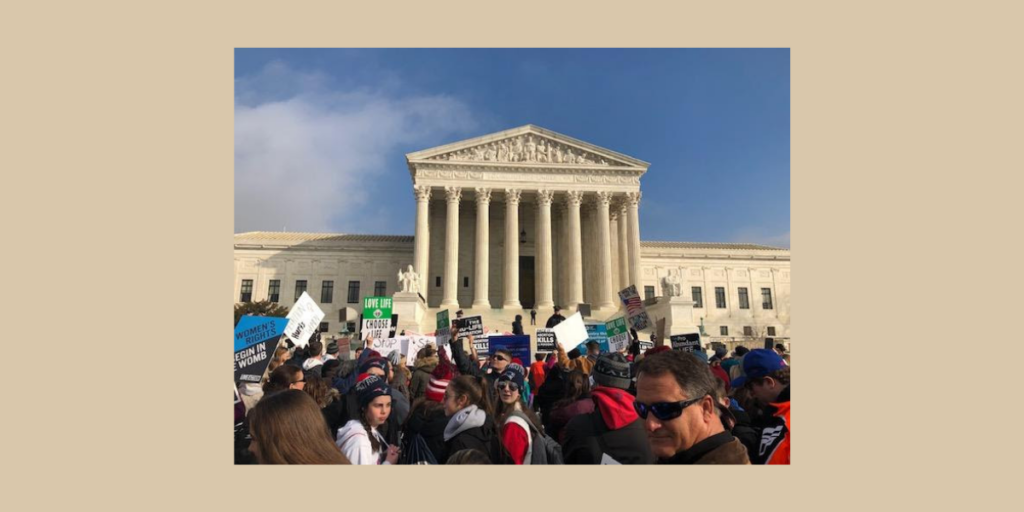
Supreme Court to Consider Pro-Life Challenge to Abortion Counseling Ban
By: Matthew Vadum, originally published January 7, 2025, The Epoch Times
A local law in Illinois forbids approaching women outside clinics to advise of abortion alternatives.
The Supreme Court said that on Jan. 10, it will consider a petition asking it to invalidate a local Illinois law that forbids outreach within a so-called bubble zone outside abortion clinics. The announcement came in a Jan. 6 update to the court docket in the case known as Coalition Life v. City of Carbondale. If at least four of the nine justices vote at the judicial conference to hear the petition, oral argument is likely to be scheduled soon after.
Coalition Life, a pro-life sidewalk counseling organization, argued in its petition docketed in July 2024 that the 2023 law violates sidewalk counselors’ First Amendment right to approach women near abortion facilities to advise them of alternatives to abortion.
The local disorderly conduct ordinance being challenged makes it illegal—within 100 feet of a hospital, medical clinic, or health care facility— to come within eight feet of another person with the intention of distributing leaflets, displaying signs, or participating in protest, education, or counseling.
Coalition Life, which is active in sidewalk counseling outside abortion clinics in Kansas, Missouri, and Illinois, sued Carbondale, arguing that the local law was unconstitutional.
Pro-life groups argue that laws restricting free speech outside abortion clinics deserve to be reexamined in light of the Supreme Court’s 2022 ruling in Dobbs v. Jackson Women’s Health Organization, which overturned Roe v. Wade (1973) and held that there was no right to an abortion under the U.S. Constitution.
The 2022 ruling meant abortion was no longer considered protected by the Constitution and that instead it was left to individual states to decide on their regulations. As a result, laws that limit advocacy outside abortion clinics need to be curbed, according to these groups.
In July 2023, U.S. District Judge Stephen McGlynn of the Southern District of Illinois dismissed the lawsuit against Carbondale’s bubble-zone law in a brief two-page ruling.
The judge found that the lawsuit was barred by the Supreme Court ruling in Hill v. Colorado (2000).
In Hill v. Colorado, the Supreme Court upheld a Colorado law prohibiting activists opposed to abortion from coming within eight feet of another person within a 100-foot zone around a health care facility without that person’s consent. The high court ruled that activists were still free to express their opinions outside the designated zone.
In March 2024, a three-judge panel of the Seventh Circuit dismissed Coalition Life’s appeal of McGlynn’s decision. In its three-page order, the circuit court found that the group’s arguments were “foreclosed” by Hill v. Colorado.
Peter Breen, executive vice president and head of litigation at the Thomas More Society, a public interest law firm on Coalition Life’s legal team, said in July 2024 that it is time for the Supreme Court to overturn the Hill v. Colorado precedent that keeps bubble-zone laws alive.
“Now that the Supreme Court has returned the abortion debate to the people and their legislators, it is more important than ever to restore the free speech rights of those who advocate for life in the public square,” Breen said. “Hill v. Colorado was egregiously wrong on the day it was decided, and it remains a black mark in our law to this day.”
Carbondale’s attorney, Neal Katyal of Hogan Lovells in Washington, urged the Supreme Court not to take up the case. No decisions issued by federal courts of appeals conflict with the Seventh Circuit’s ruling, Katyal wrote in an October 2024 brief.
The Epoch Times reached out for comment to Katyal and Coalition Life’s attorney, Paul Clement of Clement and Murphy in Alexandria, Virginia, but no replies were received by publication time.
Matthew Vadum is an award-winning investigative journalist and contributor to The Epoch Times.
